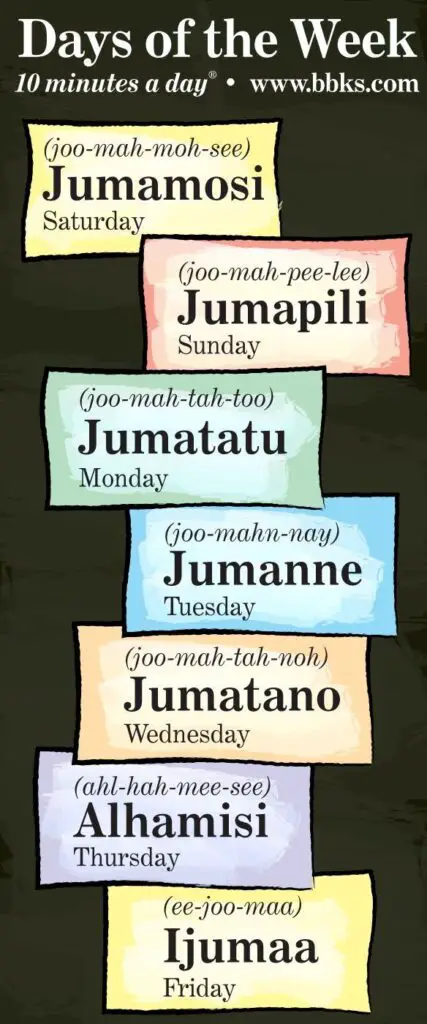Table of Contents

Days of the week in Swahili are one of the hardest things to learn for English speakers.
Even though Swahili was my first language (but English is now my primary language), and I have been living in Tanzania for over a decade, I still get tripped up about the days of the week sometimes and have to do a mental count to get it right.
Before I actually begin to tell you what the days of the week are in Swahili, let me begin to tell you about how the week is structured in the Swahili language.
In most of the English-speaking world (which has historically been mostly Christian), Sunday is the holy day of the week and so the new week begins on Monday, the following day.
In the primarily Muslim Swahili-speaking part of the world, the Holy Day of the week is Friday or Ijumaa.
The first day of the week is therefore Saturday or Jumamosi (‘day one’).
If you can remember this main difference in how the week is structured in Swahili vs. English, this will go a long way in helping you learn and remember the days of the week in Swahili.
Ok, so now…let’s get to it.
- Day 1 of the week (Saturday) is Jumamosi (literally ‘day one’).
- Day 2 of the week (Sunday) is Jumapili (literally ‘second day’).
- Day 3 of the week (Monday) is Jumatatu (literally ‘third day’).
- Day 4 of the week (Tuesday) is Jumanne (literally ‘day four’).
- Day 5 of the week (Wednesday) is Jumatano (literally ‘day five’).
Then for the last two days of the week, things switch up a bit:
- Day 6 of the week (Thursday) is Alhamisi, and
- Day 7 of the week, the Holy Day (Friday) is Ijumaa.
That is it: that is how you say the days of the week in Swahili. Good luck on learning them and rememebering them.
The Swahili days of the week follow a unique naming system rooted in the Islamic calendar, reflecting the historical and cultural influences of Arabic on the Swahili language. The names are largely based on counting from Friday (Ijumaa), which is considered the most important day of the week in Islam due to the Friday congregational prayers. Unlike the Western system, which often starts the week on Sunday or Monday, Swahili days of the week traditionally begin with Saturday, named Jumamosi, meaning “the first day after Friday.”
Breakdown of the Days of the Week in Swahili Language
- Jumapili (Sunday)
The name Jumapili comes from Juma, which means “week,” and pili, which means “two.” It signifies that Sunday is the second day after Friday. In many Swahili-speaking regions, Sunday is considered a day of rest, aligning with Christian traditions, although its name still follows the Islamic counting system. - Jumatatu (Monday)
Jumatatu follows the same pattern, with tatu meaning “three,” indicating that Monday is the third day after Friday. In modern contexts, Monday is the start of the workweek, similar to many Western cultures. - Jumanne (Tuesday)
The word nne means “four” in Swahili, so Jumanne is the fourth day after Friday. Despite Swahili incorporating many Arabic influences, its numerical system remains primarily Bantu, which is evident in the use of native Swahili numbers for naming the days. - Jumatano (Wednesday)
Tano means “five,” making Jumatano the fifth day after Friday. The numerical logic of Swahili day names is simple and consistent, making them easy to learn for speakers of related Bantu languages. - Alhamisi (Thursday)
Unlike the preceding days, Alhamisi does not follow the Swahili numerical pattern. Instead, it is directly borrowed from Arabic. The Arabic word al-khamis means “the fifth,” corresponding to Thursday. This reflects the strong influence of Arabic and Islamic traditions on Swahili culture, especially in coastal regions.
Photo credit: LizMundi1